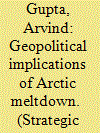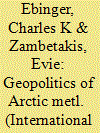| Srl | Item |
| 1 |
ID:
086227


|
|
|
|
|
| Publication |
2009.
|
| Summary/Abstract |
The Arctic Ocean is melting at an alarming pace. In 2005, the extent of summer-time ice in the Arctic was the lowest in the last 50 years, and in 2007, it was 38 per cent lower than the average since 1978. During 1996-2007, summer-time ice in the Arctic declined at an annual rate of 11 per cent. At this rate, the Arctic Ocean may become totally free of ice in summer in a few years, maybe even by 2013. Scientists link the melting of ice in the Arctic Ocean to global warming. The meltdown in the Arctic is dramatic proof of the dire implications of climate change and also an indication of the worsening health of the planet.
|
|
|
|
|
|
|
|
|
|
|
|
|
|
|
|
| 2 |
ID:
091819


|
|
|
|
|
| Publication |
2009.
|
| Summary/Abstract |
The rapidity of Arctic melt is no longer the phantasmagoria of B-grade movies, such as the 'Day after tomorrow', but is occurring at a rate unimaginable just a few years ago. In 2007, more than one million square miles of ice melted, leaving the region with only half the ice that existed in 1950. The Arctic has been propelled into the centre of geopolitics as global climate change has transformed the region into a maelstrom of competing commercial, national security and environmental concerns with profound implications for the international legal and political system. The prospect of longer ice-free periods in the Arctic has momentous implications for the region's commercial development, in itself a further risk to melting Arctic ice. This article argues that Arctic melt does and will continue to pose economic, military and environmental challenges to the governance of the region and explores the role of technological factors as both a barrier and an enabler of access. Working within existing institutions and building capacity is preferable to the proliferation of new institutions, although the full structure and scope of the legal and regulatory frameworks that may be needed are, at present, unclear. But what is clear, is that Arctic melt is on the increase.
|
|
|
|
|
|
|
|
|
|
|
|
|
|
|
|